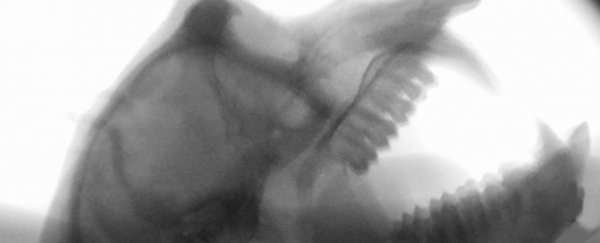Monkeys and apes can't learn new vocalisations such as human speech sounds, and now scientists think they know why.
Thanks to detailed X-rays of macaque monkeys, we now know that their vocal tracts are flexible enough to produce a wide range of sounds making up thousands of distinct words. That means the reason they can't speak is likely related to how their brains work, rather than any physical limits on their vocal anatomy.
Researchers from Princeton University and the University of Vienna in Austria say their work suggests a basic form of spoken language could have evolved at any point in the evolution of our primate relatives, with no changes needed in vocal anatomy.
"For four decades, the inability of non-human primates to produce human speech sounds has been claimed to stem from limitations in their vocal tract anatomy, a conclusion based on plaster casts made from the vocal tract of a monkey cadaver," the team explains in their paper.
"Our findings imply that the evolution of human speech capabilities required neural changes rather than modifications of vocal anatomy."
In this case, the scientists went deeper than previous research from the '70s, using X-ray videos to record 99 different vocal tract outlines, including those used in monkeys' threat calls, lip smacks, yawns, and when feeding.
 Monkey vocal anatomy (left), X-ray used in the study (right). Credit: Tecumseh Fitch and Asif Ghazanfar
Monkey vocal anatomy (left), X-ray used in the study (right). Credit: Tecumseh Fitch and Asif Ghazanfar
They say that by using living monkeys rather than the cadavers analysed for past studies, their findings are far more accurate.
The team also admits that 'monkey talk' might not sound anything like human talk, but the vocal ability to shape five vowels and several common consonants is there.
To demonstrate, they developed a computer model based on the macaque X-ray data, and used it to synthesise a few phrases if a monkey were to say them.
You can hear the rather strange results in the sound clip below, where a simulated macaque rather hopefully asks, "Will you marry me?" (and sounding a bit like a hoarse old man struggling for breath):
As the researchers note, no monkeys or apes have ever been able to produce sounds like human speech, even when trained from birth – but if their vocal anatomy is perfectly capable, then something else must be holding them back.
"[Macaque monkeys] have a speech-ready vocal anatomy, but not a speech-ready brain," researcher Asif Ghazanfar from Princeton University told Andy Coghlan at New Scientist.
"Now we need to find out why the human but not the monkey brain can produce language."
Answering that question will be for another study, but the researchers say their current findings could apply to other African and Asian primates too, known as Old World monkeys.
And the research could also point the way to how human speech evolved. By comparing the brain of a monkey to the brain of a human, we might be able to spot where evolution has given us the vocalisation advantage.
In the same way, the team's macaque model could also benefit research into what happens in the human brain when people become unable to speak normally, through injuries or other causes.
"This new result tells us that there's still a big mystery concerning where human speech came from," says psychologist Laurie Santos, from Yale University, who wasn't involved in the research.
"The paper opens whole new doors for finding the key to the uniqueness of humans' unparalleled language ability."
The research has been published in Science Advances.
